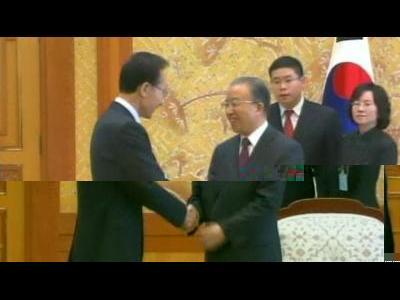China calls for urgent talks on North Korea
BEIJING – China quickened its diplomatic efforts to ease tensions between North and South Korea, calling Sunday for an emergency meeting of envoys to North Korean nuclear disarmament talks.
Chinese envoy Wu Dawei said chief negotiators to the six-nation talks are being asked to come to Beijing in early December for theemergency session "to exchange views on major issues of concern to the parties at present."
"I want to stress that a series of complicated factors have recently emerged on the Korean peninsula," Wu said in a statement he read to reporters in Beijing. "The international community, particularly the members of the six-party talks, is deeply concerned."
The talks would bring together the main regional powers — the United States, Japan and Russia as well as China and the two Koreas — that have tried fitfully for seven years to persuade North Korea to relinquish its nuclear programs.
Wu's appeal is China's most public diplomatic intervention since its ally North Korea pummeled a South Korean island with an artillery barrage on Tuesday, aggravating already high tensions on the peninsula. At first slow to react, Beijing has been under pressure by the United States to use its historically strong relations with North Korea to defuse the crisis, and over the weekend picked up the pace of its diplomacy.
State Councilor Dai Bingguo, China's highest-level foreign policy official, met Sunday with South Korean President Lee Myung-bak in Seoul, while Chinese Foreign Minister Yang Jiechi spoke by telephone with U.S. Secretary of State Hillary Rodham Clinton.
Underscoring Beijing's concern about the latest clash between the Koreas, its diplomatic initiatives come as the U.S. and South Korean military are conducting war games in the Yellow Sea. Beijing vehemently opposed such exercises four months ago during a previous spike in tensions between the Koreas, but has issued only pro forma objections this time.
Wu did not specify a date in early December for when the six nations would meet. He said they need "to exchange views on these major issues and make due contribution to maintaining peace and stability on the peninsula and easing the tension in Northeast Asia."
Wu said China hoped the meeting would also help relaunch nuclear disarmament negotiations.
The six-nation talks have been largely moribund for the past two years. In that time, North Korea tested a long-range rocket and exploded its second nuclear device, leaving the Obama administration questioning whether the North is interested in disarmament. South Korea also pulled back engagement with the North, especially after the sinking of a South Korean navy ship. Seoul says the vessel was hit by a North Korean torpedo, while the North denies involvement.
The U.S. envoy to the talks, Stephen Bosworth, made hurried visits to Seoul, Tokyo and Beijing last week after an American scientist reported being shown a new, sophisticated uranium enrichment facility in North Korea. Bosworth, however, played down any sense that the talks were urgent.
The emergency session proposed by China would mark new ground. The six-nation talks' senior envoys have not used the group to address broader security issues beyond North Korea's nuclear programs, though they have been discussed by lower-level officials. That potentially could help the group transform into a more full-bodied security forum for Northeast Asia — something some participants have advocated.
http://news.yahoo.com/s/ap/20101128/ap_on_re_as/as_china_koreas_nuclear



Tidak ada komentar:
Posting Komentar